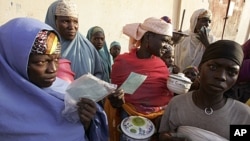Oxfam’s Niger director Samuel Braimah said Monday that “all signs point to an impending catastrophe” in the crisis-hit country. According to the British aid group, 1.9 million people are at severe risk in Niger and that number could rise to 3.5 million next month.
Samuel Braimah says failed harvests, years of drought, and regional instability are all fueling the crisis. He says a rebellion in Mali has sent thousands of people over the border into Niger, putting extra pressure on the country’s limited food resources. The Oxfam official spoke with VOA over the phone from Niger, and says trouble in Nigeria is creating further issues.
"The activities of religious fundamentalists in northern Nigeria has resulted in limited access between Niger and Nigeria, especially in the southeastern part of Niger. Niger gets quite a number of grains coming from across the border and the limited access to those border points makes access to food a bit more difficult," Braimah explained.
According to Oxfam, more than 6 million people need immediate assistance to prevent more families in Niger from going hungry. It says in some areas 100 percent of families are already rationing and reducing the number of meals they eat each day.
Braimah says Niger is only one of a number of countries across the Sahel that is in crisis.
"It is not only in Niger, it is across the Sahel. It has affected Mali, it has affected Burkina Faso, it has affected Senegal, it has affected Chad. So a crisis across that width of regions means that it is not easy to just buy grains from across the border as was the case earlier," he said.
He says the good news is that Niger’s government detected initial signs that a food crisis was looming and took early action. But Oxfam says it needs $20 million in emergency relief to help the most vulnerable people. And Braimah says aid groups are not getting the money they need.
"Money is not coming early. But the call now from every humanitarian organization and from the U.N. system and from the governments is that support should come early. People should not wait until they see dying children before they respond," Braimah stated. "We want to respond before it gets to a critical situation."
The United Nations children’s charity UNICEF says more than one million children under the age of five will be entering feeding centers in the Sahel over the next six months, suffering from severe acute malnutrition.
News
Oxfam: Hunger Crisis in Niger Turning into a Catastrophe




